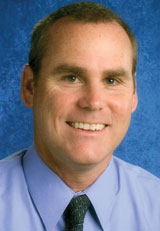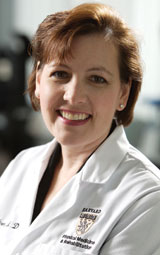Volume 30 · Number 4 · Summer 2013
Alumni Profiles
Kevin Williams ’91, Cred. ’93

Kevin Williams
Occupation: Davis Senior High School history teacher.
A sequence of fortunate events: Williams started college intending to study electrical engineering, but had a hard time connecting with calculus. An inspirational course on the American Revolution helped him see “the connectedness in history” — and high school students today are better off for it. Since earning his bachelor’s degree in history in 1991 and teaching credential in 1993, Williams has been helping students connect with U.S. history — and with each other.
A teacher of teachers: While Williams has spent most of his career teaching history at Davis High (except for two years at an international high school in South Korea in the mid-1990s), his reach extends well beyond Davis. He was named 2005 California History Teacher of the Year by the Gilder Lehrman Institute of American History and Preserve America. He mentors other teachers and collaborates with history professors at UC Davis through The History Project, which offers professional development workshops for teachers from grades kindergarten through college level from El Dorado, Placer, Sacramento, Solano, Yolo and Yuba counties. He also has given teacher-training presentations across the country. “Kevin Williams is one of the most dedicated and enthusiastic teachers I’ve ever met,” Kathy Olmsted, a UC Davis history professor who has worked with Williams professionally and as a parent. “He brings such depth of knowledge to his teaching — and he makes the class fun for the kids.”
Race in America: At Davis High, Williams teaches a popular course, “Race and Social Justice in U.S. History,” which he created in 2007 and was recognized by the city of Davis with a civil rights education award in 2011. The Thong Hy Huynh Memorial Award commemorates a Vietnamese American student who was stabbed to death in a racially motivated fight at Davis High in 1983. Williams is also adviser to Davis High’s Friendship Day, which brings students from different backgrounds together every month for activities to break down stereotypes and foster acceptance of diversity.
Roundabout Aggie: Williams started college in 1987 at the University of South Florida. After detours to Shasta College in his hometown of Redding, then Cal Poly Pomona, he found the right fit at UC Davis in 1989. “I fell in love with the school and town, and everything was so much what I had not had in every other place I had been. Even though UC Davis is a big campus, it felt small to me.” As a student, Williams, hosted a radio show on KDVS, played in an indie rock band, Luke McLuke, and worked as a checker at the Davis Food Co-op. “I just think with [UC] Davis, you get everything you want in a college atmosphere. There are so many opportunities to get involved on campus, and it’s a big, fun place. It’s between two cities, but it’s got that sense of security where you can escape the noise.” He lives in Davis with his wife, Stacey, and daughters Moira, 13, and Claire, 12.
“Every time I go somewhere, I’m trying to learn about it in relation to what we have done as a country. . . . Traveling keeps my perspective broader, and that experience can help my students see the interconnectedness of all societies.”
Wendy Weitzel, former CAAA communications officer, contributed to this report.
Q & A with Julie Silver ’87

Julie Silver
by Ada McAdow ’91
Julie Silver ’87, a rehabilitation medicine specialist at Harvard Medical School, has been working to close a gap in health care that she discovered the hard way — as a cancer patient.
Diagnosed with breast cancer in 2003, she completed chemotherapy and discovered that there were no rehabilitation services to help her recover from the after-effects of her treatment.
Unable at first to return to work or care for her children, she began rehabilitating herself. Inspired to help others, she began writing books on post-treatment healing and recovery, including After Cancer Treatment: Heal Faster, Better, Stronger (Johns Hopkins Press, 2006) and her most recent, You Can Heal Yourself (St. Martin’s Press, 2012). She also co-founded a healthcare company, Oncology Rehab Partners; she and business partner Diane Stokes created a Survivorship Training and Rehab (STAR) certification program to help hospitals and cancer centers develop and deliver rehabilitation services for cancer survivors.
Q: Before your cancer diagnosis, did you have any special interest in post-treatment care for cancer patients?
A: I am a physiatrist, a rehabilitation physician. So, I had a lot of experience with rehabilitation, including in cancer survivors. However, I didn’t really understand the complexity of these patients or the tremendous unmet needs until I went through treatment myself.
Q: How closely linked do you feel physical and emotional care are in an individual’s recovery?
A: In rehabilitation our credo is “focus on function.” Functioning well includes both physical and emotional health. They cannot be separated or one valued more over the other. In fact, new studies have just demonstrated that the primary reason for distress in cancer survivors is physical disability. This clearly demonstrates the relationship between physical and emotional health, and how important they both are to being able to function well.
Q: Why did you start writing books for cancer survivors?
A: One of my favorite courses at UC Davis was an English class in which I wrote many essays. I took mostly science classes, so that class and professor really inspired me. I began to write professionally when I became a physician. Now I am the chief editor of books at Harvard Health Publications — the consumer health voice of Harvard Medical School. Understanding cutting-edge medicine is what I spend a lot of my time on.
Q: Do you think the STAR Program is something which should/could also be applied to other kinds of rehab services, in addition to cancer?
A: Good question! Yes, we have thought about that, because it is such a great model for care. However, right now there are so many unmet needs in cancer survivors that we are staying very focused on implementing evidence-based cancer rehabilitation.
Learn more:
Website — JulieSilverMD.com
Twitter — @JulieSilverMD
